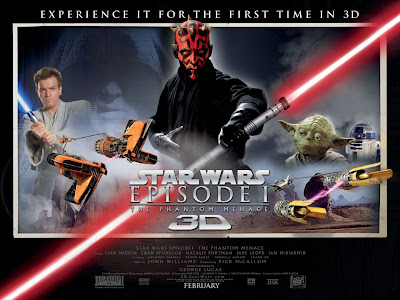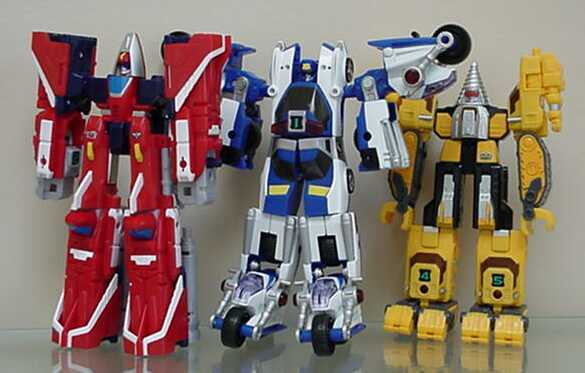Nerd Rant: To See or Not To See The Phantom Menace in 3D
I sense a three dimensional disturbance in The Force.
I love 3D movies, I love Star Wars, and I love the special effects work done by George Lucas-backed companies such as Industrial Light and Magic. However, I have no desire to see the re-release of Star Wars: The Phantom Menace in 3D. The reason is simple: Based on several reviews I've read, the converted Phantom Menace movie doesn't take full advantage of the new dimension it is supposed to have. It ranked fourth during its first weekend at the box office but I doubt that's enough to justify the cost of converting just one film to 3D, let alone six. Furthermore, if Phantom Menace falls off the top ten list this upcoming weekend, then the future of a complete Star Wars saga in 3D is more doomed than Alderaan.
What gives? This is George Lucas we're talking about here. If there's anyone in Hollywood who has easy and ready access to the latest special effects technology, it's him--and yet Phantom Menace didn't get a decent conversion to 3D? Really?
Naturally, I'm severely disappointed that the Star Wars 3D movie experience that was supposed to be probably won't happen at all. Yet the real reason why I am posting this rant is that deep, deep down inside of my little geeky heart, I'm hoping that someone will give the high-definition 3D treatment to one or more of the older anaglyph 3D classics, classics such as House of Wax and Dial M for Murder. Thus, I'm sure that the box office performance of re-released, 3D-converted titles such as Phantom Menace will have an impact on whether or not that happens. After carefully considering what has happened so far, I think that this could very well be the first time that Lucas' technological savvy has been trumped ... by Disney. Click below to learn about how the House of Mouse has beaten The Flanneled One to the 3D punch.
To be fair, while Lucas has invested a lot in advanced film production technology, Disney has plenty of experience when it comes to distributing their products. Add to that Disney's large catalog of titles, and it becomes clear that it takes more than technological sophistication and a huge built-in fan base to make 3D conversions profitable.
I think that Lucas' mistake is twofold: that the 3D conversion was lackluster and that he released it within months of the Blu-ray release of all six Star Wars movies--and less than two months after the Christmas shopping season, when I'm sure plenty of fans got their Star Wars Blu-ray sets. If you already have a Blu-ray player and a high-def TV, then there's no reason to pay extra cash for a disappointing 3D conversion when you can watch crystal-clear copies of the Star Wars movies (as well as the hours of bonus features that came with them) in the comfort of your own home. Even if you don't own the Star Wars Blu-rays yet, you'd be better off saving your money to get them than to spend it on higher-priced tickets for a 3D experience that doesn't deliver.
In contrast, Disney has been tinkering around with 3D for years by now, both with first-run 3D releases and 3D conversions. Its conversions include Lion King, Beauty and the Beast, Toy Story and Toy Story 2, and The Nightmare Before Christmas. Each time Disney re-releases a converted title, the distribution plan adheres to the same strategy: The title is released in theaters for a limited engagement, which is quickly followed by the release of the title on 3D Blu-ray. This strategy has worked quite well for Disney so far, although it's not the only way to do it. For example, Dreamworks converted its 2D Shrek movies to 3D and then released them on 3D Blu-ray without bothering with theatrical re-releases.
Regardless of which release pattern is followed, each would fail if the 3D conversion process didn't yield impressive results. I don't think that it's a coincidence that the most successful 3D conversions all happen to be animated. CGI animated movies are easier to convert to 3D than another other film, but that doesn't explain the successful conversions of 2D hand-drawn animated features and stop-motion features. Without knowing the exact processes and technology involved, it seems that the less moving elements there are on the screen the easier it is to convert it to 3D. The animation in Lion King and Nightmare Before Christmas is gorgeous, but none of their scenes are nearly as busy as an action scene from a Star Wars film--and there I believe is where the problem lies.
It could very well be that the 3D conversion process--at least for the immediate future--should strictly be limited to the domain of animation. If Lucas really wanted to enter the 3D movie arena, he should have taken a feature-length story arc from the CGI animated Clone Wars TV series, convert it into 3D, and then release it on 3D Blu-ray with a few behind-the-scenes featurettes. Yet even if 3D conversion is limited to animation, that shouldn't rule out the conversion of older, live-action films that were already shot in the 3D into a superior 3D format.
In summary: Disney can keep doing what it does in 3D because it does it well. But for Lucas, James Cameron and all of the other filmmakers who want to convert their older movies into 3D, I can only say this: Don't. There are many older films that I would love to see in 3D (click here to see my 3D conversion wish list) but please, please, please wait for the technology to catch up--even if it means waiting for the conversion of movies into holograms if that's what it takes. In the meantime, work on updating movies that were already shot in 3D, movies that were ahead of their time and are long overdue for a comeback.
Now ... who's finally going to release a high-def double feature Creature from the Black Lagoon/Revenge of the Creature 3D Blu-ray set?






Comments
Post a Comment